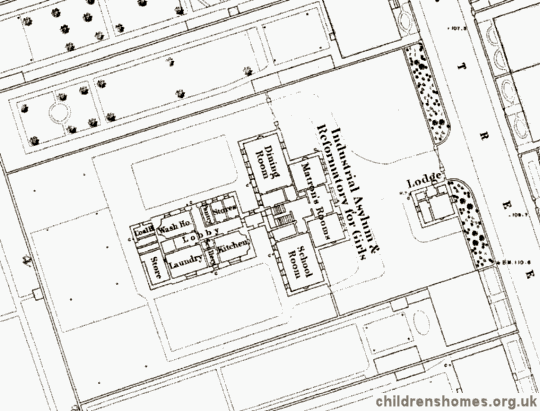Industrial Asylum and Reformatory for Girls, Aberdeen, Aberdeenshire, Scotland
A Trust was set up in 1844 by Mr Harvey of Beedlieston for the reformation of females of dissolute habits in Aberdeen. Initially, the Trust supported an existing establishment, the city's Spital Penitentiary. In June, 1859, new buildings were opened on Mount Street in Aberdeen as a reformatory for 'women of bad habits'. In 1862, the establishment was closed and the premises rented to a new management for the rescue of girls under 16. Prior to this, girls under 16 convicted in Aberdeen had to be sent to a reformatory in Edinburgh or Glasgow. The new institution, known as the Industrial Asylum and Reformatory for Girls complemented the city's existing Oldmill Reformatory for Boys.
In March, 1862, the new premises were officially certified to accommodate up to 30 girls, aged from 10 to 16 at their date of admission, who had been sentenced to detention by the courts. Girls who were judged by the management committee to be neglected or in moral danger were also received.
The location of the Mount Street establishment is shown on the 1871 map below.

Industrial Asylum and Reformatory for Girls, Mount Street, Aberdeen, c.1871.
In its early annual reports, it was recorded that:
The girls were given training to fit them for domestic service and the institution had its own working laundry. They were also kept fit with a range of physical drill exercises.
There were periodic outbreaks of trouble at the Reformatory. In 1898, six of the girls absconded while out at church. All were returned, although two had reached as far as Dundee. In the same year, five girls combined in destroying some customers' linen which had been sent for washing.
The Reformatory was closed in 1901. From 1902 until 1921, the premises were occupied by the Aberdeen Institute for the Deaf and Dumb. In the 1970s, a confectionery works operated on the site. The buildings no longer survive and the site is now occupied by modern flats.
Records
Note: many repositories impose a closure period of up to 100 years for records identifying individuals. Before travelling a long distance, always check that the records you want to consult will be available.
- None identfied at present — any information welcome.
Census
Bibliography
- Carpenter, Mary Reformatory Schools, for the Children of the Perishing and Dangerous Classes, and for Juvenile Offenders (1851, General Books; various reprints available)
- Carlebach, Julius Caring for Children in Trouble (1970, Routledge & Kegan Paul)
- Higginbotham, Peter Children's Homes: A History of Institutional Care for Britain's Young (2017, Pen & Sword)
- Abel Smith, Doroth Crouchfield: A History of the Herts Training School 1857-1982 (2008, Able Publishing)
- Garnett, Emmeline Juvenile offenders in Victorian Lancashire: W J Garnnett and the Bleasdale Reformatory (2008, Regional Heritage Centre, Lancaster University)
- Hicks, J.D. The Yorkshire Catholic Reformatory, Market Weighton (1996, East Yorkshire Local History Society)
- Slocombe, Ivor Wiltshire Reformatory for Boys, Warminster, 1856-1924 (2005, Hobnob Press)
- Duckworth, J.S. The Hardwicke Reformatory School, Gloucestershire (in Transactions of the Bristol and Gloucestershire Archaeological Society, 1995, Vol. 113, 151-165)
Links
- Red Lodge Museum, Bristol — a former girls' reformatory.
Except where indicated, this page () © Peter Higginbotham. Contents may not be reproduced without permission.


